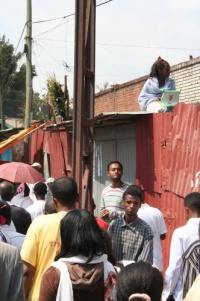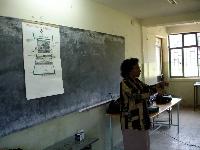I have worked in Ethiopia since 2006 and I initiated the One Laptop Per Child project here as an unintended side project within a larger capacity development program in the summer of 2006 with discussions with Nicholas Negroponte and the OLPC organisation. The following represents my personal opinion as a private person.
In mid 2007 we received 10 B2 machines and immediately went into a school to test the reaction of voluntary children. As there was no internet connection available, the children concentrated on etoys. In December 2007 we got 80 B4 machines and introduced them in two classes in a primary school in Addis Ababa.
In early 2008 the Ethiopian government took over the complete ownership of the project and implemented 5,000 XOs later that year in what they call a "parallel phased" integration. This means that the children use the XO in both their school and private time. The whole approach is based on three principles:
- capacity development for teachers
- content (all Ethiopian textbooks) and
- the OLPC hardware & open source software.
Being an observer since handing the project over, I would like to share my thoughts on this. First of all I find it very surprising that so many people pretend to have first hand knowledge of the current situation in Ethiopia. I personally find it questionable that people that have never been in Ethiopia, or if they have for only 3 weeks, can give statements about the current status of the OLPC project here.
It's always easy to judge from the comfort zone of your own living room with a Wi-Fi 100 Mbit connection. Regarding the previous remarks, the information used for the recent article "XO Laptops are Banned in OLPC Ethiopia Classrooms" about the OLPC project in Ethiopia is from November 2008 (barely 2 months after the deployment of 5,000 XOs).
The only serious independent academic research of the OLPC Ethiopia project is being conducted by the University of Groningen as a 2 year on-site monitoring and evaluation project. The preliminary results will soon be published in an academic journal and we will follow up with a separate article once these details become available.
Whoever is really interested in the project please wait for the report from the University of Groningen and get in contact with the project manager via OLPC Ethiopia wiki page.
Written by Thomas Rolf in Addis Ababa, Ethiopia.
Editor's Update (2009-07-06): The original article erroneously contained some results from a yet unpublished research paper. Since this can cause grievances for the researchers we have decided to subsequently remove that data. We will of course take a closer look at the full results once they have been appropriately published. The author apologizes for the inconvenience.
Stay up with OLPC Ethiopia: subscribe to OLPC News via RSS Feed, Emails or Twitter.




Thomas, thanks for this information. It looks as though the researchers at Groningen are succeeding in creating a responsible and well-designed study. In the presentation that you link to, they only list the following results:
Summary of first changes
Laptop usage:
› Children mainly use their laptop at home.
› A learning device! Favorite acticity is writing.
› They share it, often with parents
First social tranformation:
› Some changes in cultural values
› The laptop increases the motivation to go to school in
the countryside.
Are there other publications that include the more robust results that you cite? (e.g., 3 to 4% increased academic performance). Any additional information about the research methods or results will be appreciated.
thanks for asking, the best way is to get in direct contact with the University of Groningen which is publishing the report. They are also the best to describe the research methods.
Great news. I am happy that a good evalution study is being done, and even more happy that it is finding such good outcomes.